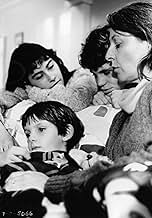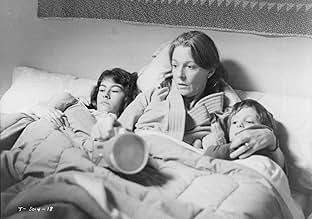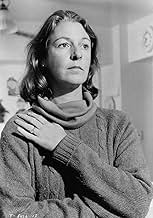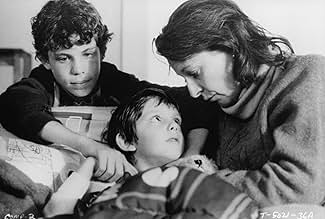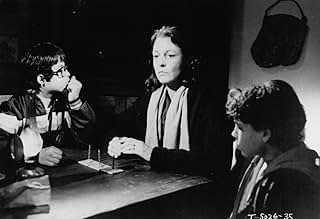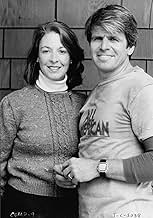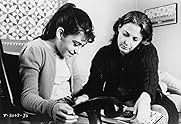IMDb रेटिंग
6.9/10
7.6 हज़ार
आपकी रेटिंग
एक परमाणु हमले के बाद एक उपनगरीय अमेरिकी परिवार का जीवन क्षतिग्रस्त हो गया है.एक परमाणु हमले के बाद एक उपनगरीय अमेरिकी परिवार का जीवन क्षतिग्रस्त हो गया है.एक परमाणु हमले के बाद एक उपनगरीय अमेरिकी परिवार का जीवन क्षतिग्रस्त हो गया है.
- 1 ऑस्कर के लिए नामांकित
- 2 जीत और कुल 6 नामांकन
Rossie Harris
- Brad Wetherly
- (as Ross Harris)
William G. Schilling
- Pharmacist
- (as William Schilling)
फ़ीचर्ड समीक्षाएं
This is one of those films that is very draining to watch, but worth it. It is a slightly more tame approach to the subject matter, but excellently done.
It is often compared with "Threads", which many people think is too graphic. Regardless, I like both films. I have to say that "Testament" will look more realistic to rural people, who may just die slowly as the characters in this film do, rather than be subjected to the immediate effects of the attack.
Rebecca De Mornay's appearance in this film, which I only saw after seeing "By Dawn's Early Light", makes a connection between these two films. Everyone should see both films at least once, as well. Excellent performances from Rossie Harris and Mako make this film stand out even further.
Having seen "The Day After" now, I prefer "Testament" but find both films excellent.
It is often compared with "Threads", which many people think is too graphic. Regardless, I like both films. I have to say that "Testament" will look more realistic to rural people, who may just die slowly as the characters in this film do, rather than be subjected to the immediate effects of the attack.
Rebecca De Mornay's appearance in this film, which I only saw after seeing "By Dawn's Early Light", makes a connection between these two films. Everyone should see both films at least once, as well. Excellent performances from Rossie Harris and Mako make this film stand out even further.
Having seen "The Day After" now, I prefer "Testament" but find both films excellent.
Testament (1983) was one of the few films that came out during the 80's that dealt with the Nuclear War scenario seriously. Jane Alexander stars as the matriarch of your typical middle class family. One day when the father (Bill Devane) is on a business trip, life as we know it was ended when the missiles were launched. Who or what caused this holocaust was never explained. But the only that thing that matters now is survival and trying to keep the family together. What tragic world lies ahead for the family now that life as they knew it was changed forever?
A real heartbreaking film that shows the side of the human condition that we all have deep within us. There's no big budgeted effects or over the top acting in this film. Just raw emotion, great acting and a real good script and direction that fuels this drama. I strongly recommend this movie for all the reasons I have stated.
A real heartbreaking film that shows the side of the human condition that we all have deep within us. There's no big budgeted effects or over the top acting in this film. Just raw emotion, great acting and a real good script and direction that fuels this drama. I strongly recommend this movie for all the reasons I have stated.
I've been a fanatic of disaster movies and post-apocalypse Sci-Fi for practically my entire life already, but I have deliberately been avoiding the actual "nuclear bomb impact" films. There were several of these released during the early 80's. Apart from "Testament", there's also "The Day After", "Threads", "Letters from a Dead Man" and "When the Wind Blows". All these aforementioned films have high ratings, favorable reviews and impeccable cult-reputations. So, then why haven't I seen them before? Because the impact of these films, pretty much like the H-bomb itself, is downright devastating, and yours truly is a very sensitive person!
There's a world of difference between sci-fi films set in post-nuclear wastelands, where a handful of human survivors drive around in dune buggies and battle each other over a tank of fuel, and actually witnessing the long and excruciatingly painful process which leads to the complete extinction of mankind. And even though writer Carol Amen and director Lynne Littman absolutely restrain from turning "Testament" into a sentimental tearjerker, the film is inescapably harrowing, and numerous sequences caused me to burst into tears.
The story takes place in the peaceful little community of Hamlin, a suburb of San Francisco, and introduces the model family of Tom and Carol Wetherly and their three children. Everything they love and worked for literally vanishes in a bright and sudden flash. Hamlin's unusual geographical location, in a sort of mountain bowl, safeguards the town from instantaneous destruction, but this rapidly proves to be a curse instead of a blessing. Without any form of sensationalism, or raising idle hope, Littman depicts how the townspeople and loved ones succumb around Carol, whilst radio contact with the rest of the world fades even further away.
The aptly titled "Testament" is a beautiful, frustrating, haunting, infuriating and noble film all at once. The performances are stellar, and the use of music is staggering. The only remote default, according to me, isn't even a shortcoming in the film itself. I find it unjust that so many people must emphasize in their reviews that "Testament" was directed by a woman, and hence make the film somewhat of a monument of feminism. As far as I'm concerned, gender equality is incontrovertible, and women are just as skilled and talented as directors as males. Lynne Littman did a fantastic job as a director; - period!
There's a world of difference between sci-fi films set in post-nuclear wastelands, where a handful of human survivors drive around in dune buggies and battle each other over a tank of fuel, and actually witnessing the long and excruciatingly painful process which leads to the complete extinction of mankind. And even though writer Carol Amen and director Lynne Littman absolutely restrain from turning "Testament" into a sentimental tearjerker, the film is inescapably harrowing, and numerous sequences caused me to burst into tears.
The story takes place in the peaceful little community of Hamlin, a suburb of San Francisco, and introduces the model family of Tom and Carol Wetherly and their three children. Everything they love and worked for literally vanishes in a bright and sudden flash. Hamlin's unusual geographical location, in a sort of mountain bowl, safeguards the town from instantaneous destruction, but this rapidly proves to be a curse instead of a blessing. Without any form of sensationalism, or raising idle hope, Littman depicts how the townspeople and loved ones succumb around Carol, whilst radio contact with the rest of the world fades even further away.
The aptly titled "Testament" is a beautiful, frustrating, haunting, infuriating and noble film all at once. The performances are stellar, and the use of music is staggering. The only remote default, according to me, isn't even a shortcoming in the film itself. I find it unjust that so many people must emphasize in their reviews that "Testament" was directed by a woman, and hence make the film somewhat of a monument of feminism. As far as I'm concerned, gender equality is incontrovertible, and women are just as skilled and talented as directors as males. Lynne Littman did a fantastic job as a director; - period!
1983..The cold war was in full swing and the fear of nuclear armageddon hung over all our heads. ABC released "The Day After", (which I have already commented on) but in all the furor around that, "Testament" was released. This is THE 1980's nuclear war film. It doesn't deal with the effects on an entire community, but rather on one small, close knit family in California. Jane Alexander's performance was one of legend, and is possibly one of the classic dramatic performances of all time. The day begins innocently enough, dad heads off to work, the kids watch "Sesame Street"..then the Emergency Broadcast System cuts in and the world stops. Ignore all the Y2K mumbo-jumbo and put yourself back in 1983 (most of us know where we were) and watch this film. You may not be "entertained", but you will appreciate what you have just a bit more.
I first saw "Testament" when it came out in 1983. At the time, I was 30 years old and the mother of a two year-old son. As a child of the Cold War years, I have always been interested in films about that most unthinkable event: the detonation of a nuclear bomb or bombs somewhere on our fragile planet. If you are, too, you must watch "Testament" (and another small gem of a slightly earlier era called "Fail-Safe.")
This is a wonderful film that slowly, unbearably reveals what happens in the small, idyllic town of Hamlin after a full-scale nuclear exchange between the superpowers wipes out a large part of America. The town and its citizens, including the Weatherly family, escape initial destruction. But slowly the bonds that hold western societies together (electricity, communication, fresh food, medical help) begin to fray and ravel. There is no television. Batteries to power transistor radios suddenly become more valuable than $20 bills in a town where, suddenly, there's nothing left to buy.
The story and scenes are permeated with a sense of enormous loss. A family loses its husband and father who simply walked out the door, waving a breezy goodbye one morning, and disappeared into the holocaust. All his wife, Carol, and two children have left of him are their memories and some flickering images on home movies, glimpses not just of a lost loved one, but of a lost -- and loved -- world.
A school play about the Pied Piper was in rehearsal before catastrophe hit, and, desperate to recapture some normalcy and to divert the children's attention from a reality to horrible to contemplate, the town decides to go on with the show.In the earlier rehearsal scenes, life was normal, the future shone brightly in the children's faces. Now, as the parents watch the performance, they see no future for these beautiful innocents. To me, this is the key scene of the film: the contrast between what these people once had and what has been lost is staggering. It makes you want to go outside, smell the air, marvel at the full supermarket shelves and the working telephone lines. (This is a gift that the movie gives its audience which goes far beyond entertainment and approaches enlightenment.)
Beyond the wonderful writing, direction and performances, I love the tiny touches in the story. For example, there's the foreshadowing, the implicit warning contained in the presence of a minor character, a little Japanese boy with Down Syndrome who is cared for by the town after his father dies. The child's name is Hiroshi. Pay attention, the script commands us in a whisper: Hiroshima happened once, but it can happen again, and it can happen to you as well as "them."
In the end, the movie is a testament to this undeniable fact, a testament to the stupidity of men who continue building ever-larger, more lethal means of mass destruction, and finally, a testament to the strength of mothers like the character of Carol Weatherly who have no choice but to love and protect their children no matter what comes.
This is a wonderful film that slowly, unbearably reveals what happens in the small, idyllic town of Hamlin after a full-scale nuclear exchange between the superpowers wipes out a large part of America. The town and its citizens, including the Weatherly family, escape initial destruction. But slowly the bonds that hold western societies together (electricity, communication, fresh food, medical help) begin to fray and ravel. There is no television. Batteries to power transistor radios suddenly become more valuable than $20 bills in a town where, suddenly, there's nothing left to buy.
The story and scenes are permeated with a sense of enormous loss. A family loses its husband and father who simply walked out the door, waving a breezy goodbye one morning, and disappeared into the holocaust. All his wife, Carol, and two children have left of him are their memories and some flickering images on home movies, glimpses not just of a lost loved one, but of a lost -- and loved -- world.
A school play about the Pied Piper was in rehearsal before catastrophe hit, and, desperate to recapture some normalcy and to divert the children's attention from a reality to horrible to contemplate, the town decides to go on with the show.In the earlier rehearsal scenes, life was normal, the future shone brightly in the children's faces. Now, as the parents watch the performance, they see no future for these beautiful innocents. To me, this is the key scene of the film: the contrast between what these people once had and what has been lost is staggering. It makes you want to go outside, smell the air, marvel at the full supermarket shelves and the working telephone lines. (This is a gift that the movie gives its audience which goes far beyond entertainment and approaches enlightenment.)
Beyond the wonderful writing, direction and performances, I love the tiny touches in the story. For example, there's the foreshadowing, the implicit warning contained in the presence of a minor character, a little Japanese boy with Down Syndrome who is cared for by the town after his father dies. The child's name is Hiroshi. Pay attention, the script commands us in a whisper: Hiroshima happened once, but it can happen again, and it can happen to you as well as "them."
In the end, the movie is a testament to this undeniable fact, a testament to the stupidity of men who continue building ever-larger, more lethal means of mass destruction, and finally, a testament to the strength of mothers like the character of Carol Weatherly who have no choice but to love and protect their children no matter what comes.
क्या आपको पता है
- ट्रिवियाThe film was originally shot as a made-for-TV movie. Paramount executives were so impressed with it that they released it in theaters as a feature. The cast sued the producers for higher pay, claiming they were paid television salaries and not feature film salaries. The case was settled out of court.
- भाव
Mary Liz Wetherly: [Remember] the morning I walked in on you and Dad?
Carol Wetherly: Yes.
Mary Liz Wetherly: What's it like?
Carol Wetherly: What's what like?
Mary Liz Wetherly: Making love. Don't play mother with me.
Carol Wetherly: That's what I am.
- साउंडट्रैकAll My Loving
(1963)
By John Lennon and Paul McCartney
Produced by Andrew Dorfman
Performed by Mitch Weissman
Courtesy of Mac Len Music
टॉप पसंद
रेटिंग देने के लिए साइन-इन करें और वैयक्तिकृत सुझावों के लिए वॉचलिस्ट करें
विवरण
- रिलीज़ की तारीख़
- कंट्री ऑफ़ ओरिजिन
- भाषा
- इस रूप में भी जाना जाता है
- Das letzte Testament
- फ़िल्माने की जगहें
- उत्पादन कंपनियां
- IMDbPro पर और कंपनी क्रेडिट देखें
बॉक्स ऑफ़िस
- US और कनाडा में सकल
- $20,44,892
- US और कनाडा में पहले सप्ताह में कुल कमाई
- $3,17,996
- 6 नव॰ 1983
- दुनिया भर में सकल
- $20,44,892
इस पेज में योगदान दें
किसी बदलाव का सुझाव दें या अनुपलब्ध कॉन्टेंट जोड़ें



